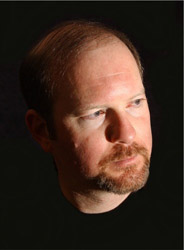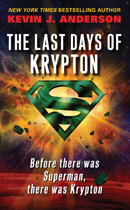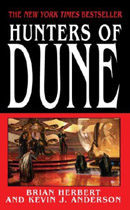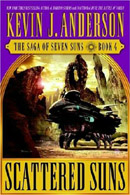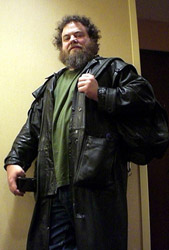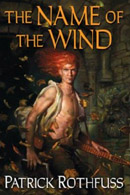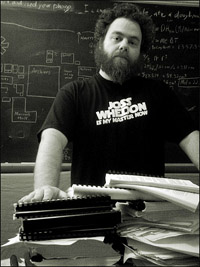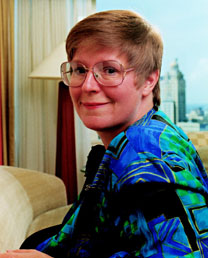
Ms Lois McMaster Bujold became known to the Bulgarian readers with her most successful series - the Vorkosigan novels, dealing with the space adventures of Miles Vorkosigan. These books have inspired a strong and devoted following around here, to the point where we have actually never heard anyone dislike the Miles books. Ever. Following were some of her more recent fantasy novels, such as The Spirit Ring, the Chalion series and most recently the Sharing Knife series, building up to her fandom base. As admirers of Ms Bujold's work, it was a great pleasure for us to be able to do this interview with her.
Shadowdance: The main characters in your books are often aristocrats of some sort. What is the reason for that and why do you reckon people like such protagonists even in a SF setting?
Ms Bujold: It is a source of some bemusement to me that my stories with aristocratic protagonists do seem to sell better than my stories with middle-class protagonists. (I’ve written both; the fact that you are more keenly aware of the first tells its own tale.) My theory is that high bio-social status is an in-built attractor, like sugar to the human palate, and for some of the same reasons.
Unlike the need for food and water and sex, status really hasn’t been studied much directly in the terms of evolutionary biology, which is the conceptual space in which I think it really belongs. But a person’s status, in a group -- and humans evolved in groups -- can have a profound impact on that person’s ability to access every other survival need. People in the throes of a perceived status emergency are at their most dangerous, just as if they’d been denied water or food.
But yes. Almost all people everywhere are partial to stories where the protagonists have or gain bio-social status. Most readers seem to want to identify upward, not downward. There is also, on the fairy or folk tale level, a deal of not-so-covert family psychology playing out, with kings as story-stand-ins for fathers, queens for mothers, princes as sons, princesses as daughters, and so on, which, quite literally, hits audiences where they live.
The other thing about upper-class protagonists is that they often have or seem to have more political agency, more room to move and drive the plot; more ability to act effectively. This, too, is attractive in a book’s characters. Genre readers want to read about people who are doing things.
Shadowdance: Your works in recent years have all been in the Fantasy genre. Do you intend to return to SF and Miles in particular, or is this change of direction permanent?
Ms Bujold:
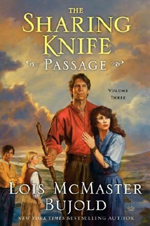 In fact, now the The Sharing Knife tetrology is finished and published (in English, at least), I am hard at work on a new Miles book for Baen. Work has been much interrupted this past year -- I had a perforated appendix last May and was writer Guest of Honor at the WorldCon in August, had a pinched nerve in my neck and a trip to Barcelona for a speech in November (simultaneously, unfortunately -- they showed me lots of Gothic cathedrals, ow…) and, of course, a book tour and a lot of PR duties for the 4th Sharing Knife book, Horizon, chores which won’t finish up till next week as I type this.
In fact, now the The Sharing Knife tetrology is finished and published (in English, at least), I am hard at work on a new Miles book for Baen. Work has been much interrupted this past year -- I had a perforated appendix last May and was writer Guest of Honor at the WorldCon in August, had a pinched nerve in my neck and a trip to Barcelona for a speech in November (simultaneously, unfortunately -- they showed me lots of Gothic cathedrals, ow…) and, of course, a book tour and a lot of PR duties for the 4th Sharing Knife book, Horizon, chores which won’t finish up till next week as I type this.But I did read from the first two chapters of the new Miles book at WorldCon. I pick up with Miles at age 39, on an investigation as an Imperial Auditor to a new planet none of my readers has seen before (since I just made it up), and with a mostly-new cast of characters. The tale is mystery-suspense, and I was just able to finish Chapter 11 in January before I had to break off for the book tour. The book doesn’t have a title yet, nor a second half. I’m anxious to get back to it -- I really want to know what happens next!
I don’t know what I’ll do after that, besides take an overdue break to refill my well.
Shadowdance: Has Barrayar's transition from feudalism to spaceship technology and colonies in just two generations been influenced by a real-world nation?
Ms Bujold: Dozens of them. Barrayar since the end of its Time of Isolation is really a metaphor for the whole 20th Century. The Russian influence is obvious in its founder population, but another historical model I looked to was Meiji Japan and its forcible opening to the West.
Shadowdance: Do you intend to write more books in the Chalion world?
Ms Bujold: Possibly. I’ve become fascinated with series as artistic structures in their own right, as different from a novel as the novel is from the short story. But nobody on the academic side seems to be studying series in any comparative way, likely for practical reasons; while a professor of literature might be able to get a class of undergraduates to read and discuss half a dozen novels in the course of a semester, they’re unlikely to be willing to read half a dozen series.
Anyway, with the three live series I have written so far, I’ve done three different series structures. The Miles books were a chain of largely-independent novels all centering around one character, rather like C.S. Forester’s Hornblower books. The Sharing Knife was on the model of one huge story divided into volumes so as not to break readers’ wrists, like The Lord of the Rings. Chalion is or wants to be a different body plan -- in this case, a thematic series, with one book for each of the five gods. Which means I have a book each for the Mother and the Father still to go to complete the pattern. (Although I expect the Bastard, the trickster god, will have His thumb in every pie as usual.) Since the Father is the Chalionese god of justice, and the Mother the goddess of, among other things, medicine, there are lots of story possibilities here. But I haven’t committed to anything yet.
Shadowdance: Have you been accused of feminist tendencies in your works?
Ms Bujold: “Accused”? I wasn’t aware it was a crime.
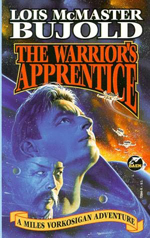
Of course I’m a feminist -- a woman who isn’t a feminist would be like a slave in favor of slavery -- but that is one of those terms that one must check in every conversation in which it crops up, to be sure that all parties are using the same definition for it. What do you mean by “feminist”?
I’m also confused by your term, “feminist tendencies in my work”. I write about people; ideally, that should include every sort of human behavior, though I naturally gravitate to the sorts that most interest me. It’s my book; unless I write what I want, there’s no point.
I am not, however, writing to promulgate any particular agenda. Tolkien has a famous passage in which he describes the difference between allegory, which he cordially loathed, and applicability. “In one lies the freedom of the reader,” he sums up, “and in the other the purposed domination of the writer.” Should readers find my tales applicable -- and it’s clear that many do -- I am of course interested in how, but it’s hardly an effect under my control.
Shadowdance: What do you think of the recent "new wave" of Fantasy, heralded by names like Scott Lynch, R. Scott Bakker, Stephen Erikson, Hal Duncan etc.? Do you think the genre is finally moving away from the cliches most people associate it with?
Ms Bujold: I haven’t kept up with the recent genre in my reading, I’m afraid; I mostly read outside the genre for relaxation, or non-fiction for ideas. So I have little to say, here. (Although, in light of the prior question, I do wonder where the women writers are on that list.) I did run into Scott Lynch at the World Fantasy Convention a couple of years ago; he said he loved my books, and read them with considerable enthusiasm I gathered, so I suppose I should return the favor one of these days. I need to not be in the midst of writing something of my own at the time -- as a writer, I pick up voice like lint.
Shadowdance: Which of your books do you consider the most successful and which one made you feel like you were at the peak of your abilities?
Ms Bujold: Well, I’m not done yet, so the answer to this could change over time. And, in fact, has changed over time. The most hopeful answer would be, “A book I haven’t written yet.” That said, each of my books has elements that make them special to me. But I confess to a place in my heart for the more “ornery” books, the ones written in defiance of (presumed) genre or career expectations. These would include Mirror Dance, Memory, A Civil Campaign (which was also one of the most successful in publishing terms), The Curse of Chalion, Paladin of Souls (a 40-year-old heroine, yay! Though Ista is starting to look pretty young to me these days), and the whole of The Sharing Knife. I think The Sharing Knife may be my subtlest work yet.
Shadowdance: Which one of your characters was the hardest to write about? Why?
Ms Bujold: Yeep. Well, any new character is a little harder to boot up in my brain, if I don’t know them very well yet. Each new viewpoint character re-wraps their universe, and not infrequently the plot, around themselves, which makes writing any novel with multiple viewpoints a little more challenging for me.
Shadowdance: What do you like about Japanese Animation (anime) and which is your favorite movie/show?
Ms Bujold: I’d known about anime for years, from having seen bits shown at SF conventions back as far as the mid-80s, and I’d dipped into it a little in the 90’s. But the video rental stores never had very much. Then I got a Netflix subscription, which is an online and mail-order DVD rental, with access to thousands of titles, so I was at last able to explore in earnest. I find I like best the shows with Japanese historical or contemporary settings, which show me that alien culture, and, unsurprisingly, the shojo or girls or josei or women’s styles of tales, or tales for general audiences. Giant fighting robots and endless hours of guys hitting each other, with or without swords, bore and annoy me -- Bleach, I’m looking at you, but not any more. I don’t much care for the uglier horror or crime stuff. I like older protagonists when I can get them, which is rarely. Some exceptionally interesting titles, so far, were: Mushi-Shi, Hikaru no Go, Otogi Zoshi, xxxHolic, Genshiken, The Story of Saiunkoku, Black Jack, anything by Miyazaki, Shonen Onmyouji, Get Backers, Descendants of Darkness, Fruits Basket, Mirage of Blaze, Witch Hunter Robin, Fullmetal Alchemist (though it gets dark and icky in spots), Kyo Kara Maoh, Antique Bakery, and Gokusen. No, I don’t remember all those titles; Netfix thoughtfully provides the subscriber with an on-line rental history to keep it all straight. I also get lots of non-fiction DVDs from Netflix -- science and nature, history and history of science, travel, engineering projects, and so on. I don’t have cable, and don’t watch much network TV at all these days.
Shadowdance: What do you think of writing workshops?
Ms Bujold: T
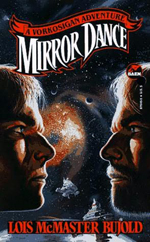 hey can be useful, depending. (They can also be damaging, depending.) It’s important to remember that one is there to write and critique, and get better at writing, not to socialize, although that warning perhaps best applies to more informal critique groups. I’ve not been through workshops myself, though I’ve usually had a crit group. I don’t think they are necessary, if the writer can find the help she needs through other routes.
hey can be useful, depending. (They can also be damaging, depending.) It’s important to remember that one is there to write and critique, and get better at writing, not to socialize, although that warning perhaps best applies to more informal critique groups. I’ve not been through workshops myself, though I’ve usually had a crit group. I don’t think they are necessary, if the writer can find the help she needs through other routes.Shadowdance: Could you share an advice you think important for aspiring authors (apart from "work hard and don't give up")?
Ms Bujold: Well, those are both good. Also, it’s important not only to read widely, but also to get people to talk to you about all sorts of their experiences, and to get many physical experiences yourself -- sports, work, travel, crafts -- because that creates your storehouse of memory from which the truly original elements of your work can arise.
Shadowdance: Do you wish to share something with your Bulgarian readers?
Ms Bujold: Except for one reader who posts in English on my chat group, I have only the vaguest notion of who my Bulgarian readers might be. But I certainly hope they may enjoy my work, and take what applicability from it as pleases them.
